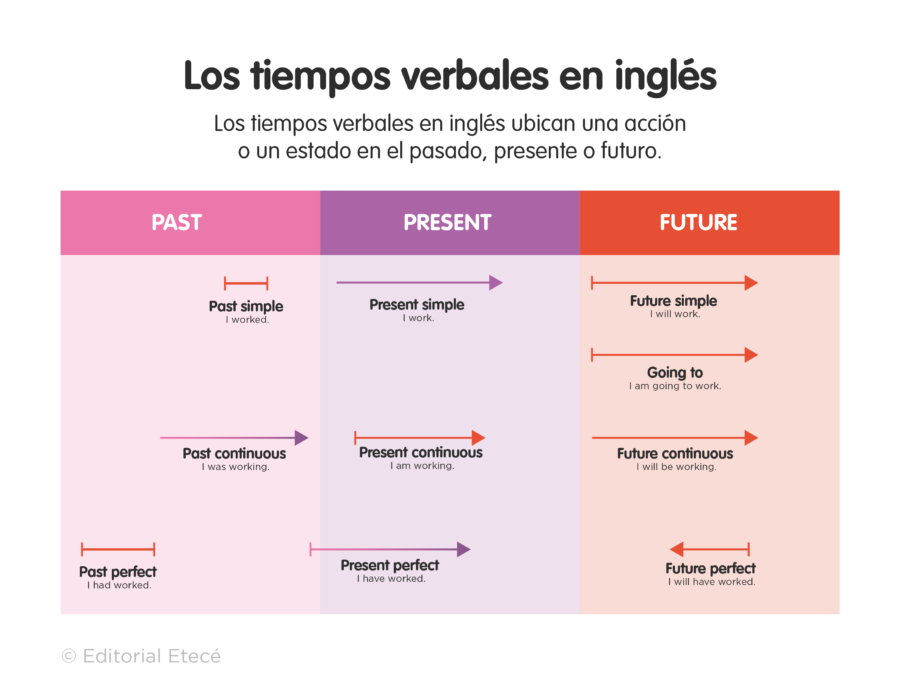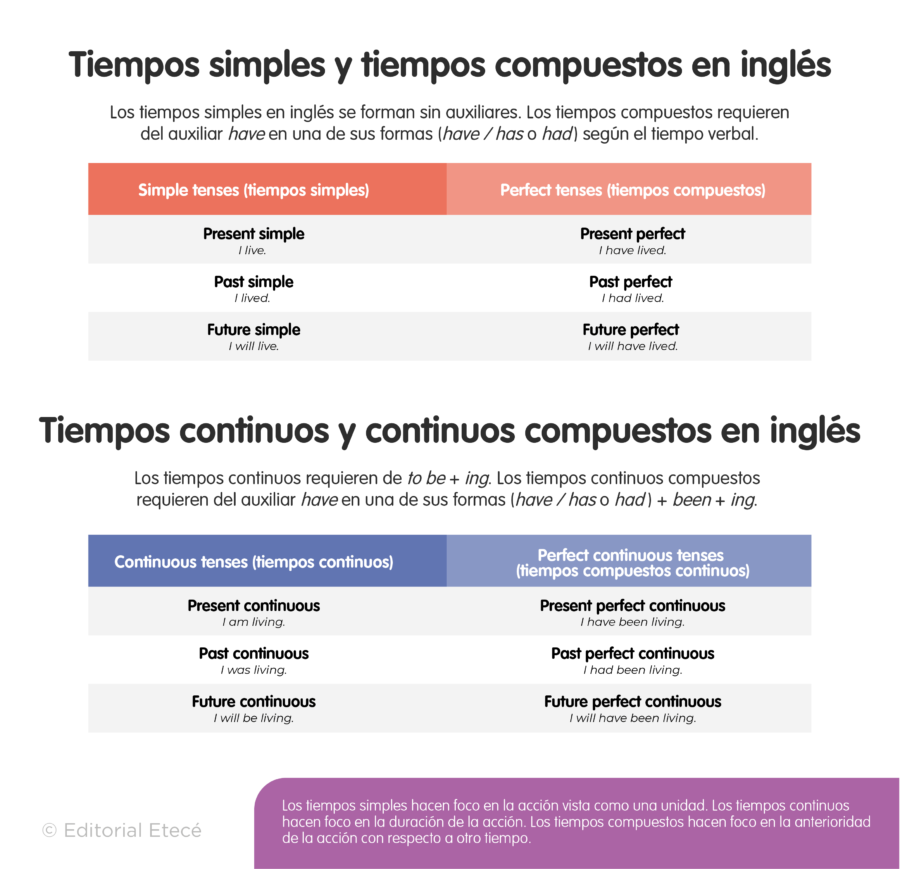Índice
El past participle (participio pasado) en inglés es una forma del verbo que se utiliza para la construcción de los tiempos compuestos (perfect tenses) y de la voz pasiva (passive voice). En español equivale al participio, que termina en -ado o -ido. Por ejemplo: gone (ido), played (jugado), won (ganado).
El past participle por sí solo no es un verbo conjugado, sino que necesita del auxiliar have para la para la formación de los tiempos compuestos (have done, had traveled), y del auxiliar be para la construcción de la voz pasiva (was written, are asked).
El past participle puede ser regular (changed, noticed) o irregular (built, driven), según el verbo. En el caso de los verbos regulares, el past participle, al igual que el past simple, termina en -ed (planned, prepared). En el caso de los verbos irregulares, el past participle puede ser igual o diferente al past simple, e incluso puede ser igual al infinitivo del verbo. Por ejemplo: bring – brought – brought, come – came – come.
Cuidado: El past participle por sí solo no se puede utilizar como verbo principal, y no se debe confundir con un verbo en past simple. Por ejemplo: I have been ill. (Y no: I been ill).
El past participle es uno de los tres participios que existen en inglés, junto con el present participle (participio presente) y el perfect participle (participio perfecto).

Ejemplos de los past participles más usados
Los past participles (participios pasados) de algunos de los verbos irregulares más utilizados en inglés son:
| Infinitive | Traducción | Past participle |
|---|---|---|
| be | ser / estar | been |
| become | convertirse | become |
| begin | empezar | begun |
| blow | soplar | blown |
| break | romper | broken |
| bring | traer | brought |
| build | construir | built |
| catch | tomar | caught |
| choose | elegir | chosen |
| come | venir | come |
| cost | costar | cost |
| cut | cortar | cut |
| do | hacer | done |
| drink | beber | drunk |
| drive | conducir | driven |
| eat | comer | eaten |
| fall | caerse | fallen |
| feel | sentir | felt |
| find | encontrar | found |
| forget | olvidar | forgotten |
| get | conseguir, obtener | gotten |
| give | dar | given |
| hear | oír | heard |
| know | saber | known |
| leave | partir | left |
| lend | prestar | lent |
| lose | perder | lost |
| make | hacer | made |
| mean | querer decir, significar | meant |
| meet | conocer, encontrarse | met |
| pay | pagar | paid |
| put | poner | put |
| rise | subir | risen |
| run | correr | run |
| say | decir | said |
| see | ver | seen |
| sell | vender | sold |
| send | enviar | sent |
| sleep | dormir | slept |
| speak | hablar | spoken |
| spend | gastar | spent |
| swim | nadar | swum |
| take | tomar / llevar | taken |
| teach | enseñar | taught |
| tell | decir, contar | told |
| think | pensar | thought |
| throw | tirar | thrown |
| understand | entender | understood |
| wake | despertarse | woken |
| win | ganar | won |
| write | escribir | written |
Los past participles (participios pasados) de los verbos regulares terminan siempre en -ed. Por ejemplo: accepted, explained, prepared, wanted.
Usos del past participle
- El past participle se utiliza junto a una forma del auxiliar have para la formación de los tiempos compuestos en inglés (perfect tenses): present perfect (have left), past perfect (had watched) y future perfect (will have finished). Por ejemplo: She has come early. / Ella ha venido temprano.
- El past participle se utiliza junto a una forma del auxiliar be para la construcción de la voz pasiva en inglés (passive voice): was painted, is carried, will be done. Por ejemplo: The bridge was constructed by a famous engineer. / El puente fue construido por un ingeniero famoso.
- El past participle se utiliza como adjetivo, generalmente derivado de verbos regulares (surprised, bored, amused). Por ejemplo: Nick is interested in sports. / Nick está interesado en los deportes.
- El past participle se utiliza junto al auxiliar have para formar el pasado de los verbos modales (modal verbs). Por ejemplo: must have been (deber haber estado), should have thought (debería haber pensado), could have done (podría haber hecho), might have answered (podría haber preguntado).
- El past participle se utiliza en cláusulas de relativo con sentido pasivo, que aportan información sobre una persona, cosa o lugar. Por ejemplo: The injured man was taken to hospital. / El hombre herido fue llevado al hospital.
Ejemplos de oraciones con past participle
- They have traveled to Europe several times.
Ellos han viajado a Europa varias veces. - “The Little Prince” has been translated into 250 languages and dialects.
“El principito” ha sido traducido a 250 idiomas y dialectos. - I had watched this movie before.
Yo ya había visto esta película antes. - He will have finished the report by next Friday.
Él habrá terminado el informe para el próximo viernes. - The child was bored during the whole concert.
El niño estuvo aburrido durante todo el concierto. - We have known each other for ages.
Nos conocemos desde hace mucho tiempo. - Tonight’s performance has been canceled.
El espectáculo de esta noche ha sido cancelado. - They should have arrived by now.
Deberían haber llegado. - Credit cards are taken.
Se aceptan tarjetas de crédito. - The goods made in this factory are excellent quality.
La mercadería hecha en esta fábrica tiene excelente calidad. - The author has written four novels.
El autor ha escrito cuatro novelas. - You must be exhausted.
Debes estar exhausto. - By the end of the year, dad will have worked for the company for 25 years.
Para fin de año, papá habrá trabajado para la compañía durante 25 años. - Scientists in our country have made ground-breaking discoveries lately.
Los científicos de nuestro país han hecho descubrimientos revolucionarios últimamente. - The bank has been robbed.
Han robado el banco. - The money stolen has been found.
El dinero robado ha sido encontrado. - The thief has been arrested.
El ladrón ha sido arrestado. - Who is the owner of the car parked here?
¿Quién es el dueño del automóvil estacionado aquí? - Liam had never played tennis before.
Liam nunca antes había jugado tenis. - My friends will have left by the time I arrive at the party.
Mis amigos se habrán ido para cuando yo llegue a la fiesta. - I love the food served in this restaurant.
Me encanta la comida que sirven en este restaurante. - Ted should have warned us about the dangers.
Ted nos debería haber advertido sobre los riesgos. - Bob has never been abroad.
Bob nunca ha estado en el exterior. - We hadn’t tried this option in the past.
No habíamos probado esta opción en el pasado. - Have you understood the explanation?
¿Has entendido la explicación? - Mom has bought a new car.
Mamá ha comprado un auto nuevo. - I had never imagined anything like this.
Nunca había imaginado algo como esto. - Tim felt frustrated after failing his driving test.
Tim se sintió frustrado después de desaprobar su examen de conducir. - The suspect has been identified.
El sospechoso ha sido identificado. - I haven’t seen Bill this morning.
No he visto a Bill esta mañana. - The Petronas Towers were designed by architect César Pelli.
Las Torres Petronas fueron diseñadas por el arquitecto César Pelli. - It hasn’t rained for a month.
No ha llovido durante un mes. - They might have helped us.
Quizás podrían habernos ayudado. - Oil price has risen drastically.
El precio del petróleo ha subido drásticamente. - I’ve searched everywhere but I can’t find my keys.
He buscado por todas partes pero no puedo encontrar mis llaves. - Craig has gone out.
Craig ha salido. - The reader will have learned this topic by the end of this article.
El lector habrá aprendido este tema al final del artículo. - The boys were rescued safe and sound.
Los niños fueron rescatados sanos y salvos. - My best friend has run a marathon twice.
Mi mejor amiga ha corrido una maratón dos veces. - The baby has woken up.
El bebé se ha despertado. - Fortunately, nobody was killed in the avalanche.
Afortunadamente nadie murió en la avalancha. - My grandparents have lived in the same house all their lives.
Mis abuelos han vivido en la misma casa toda su vida. - Have you heard the news?
¿Has oído las noticias? - Greg must have forgotten about the meeting.
Greg debe haberse olvidado de la reunión. - Sarah has decided to stay in Mexico longer.
Sarah ha decidido quedarse más tiempo en México. - He had made the whole story up.
Él había inventado toda la historia. - I’ve cut my finger with that knife.
Me he cortado el dedo con ese cuchillo. - We have had a beautiful evening.
Hemos tenido una bella velada. - The little girl has drawn a lovely sketch.
La pequeña niña ha dibujado un bonito bosquejo. - I have done my best.
He hecho lo mejor que pude.

Sigue con:
- «Third conditional» en inglés
- Verbos en gerundio en inglés
- «Mixed conditionals» en inglés
- «Second conditional» en inglés
- Verbos con «-ing» o «to infinitive»
¿Te fue útil esta información?
Sí No¡Genial! gracias por visitarnos :)